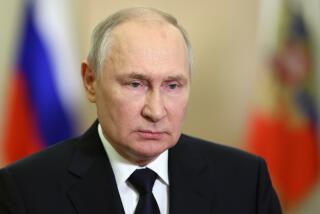Soviets Concede Stalin’s Actions Were Unjust : Monument to Ousted Latvians Pledged
- Share via
MOSCOW — Ending nearly five decades of silence, the Soviet Union acknowledged Tuesday that thousands of people had been unjustly deported from Latvia, one of three Baltic nations it occupied during World War II, and pledged that a monument, the country’s first to the victims of the late dictator Josef Stalin, will be built there to honor them.
The action by the Latvian Communist Party and government leadership was announced at a rally attended by thousands of people in Riga, the Latvian capital, on the 47th anniversary of the start of the deportations, which were intended to remove all of Stalin’s potential opponents from Latvia.
Altogether, more than 31,000 people were uprooted from Latvia and sent into exile in Siberia and other remote parts of the Soviet Union from 1941 to 1949, according to the official news agency Tass, which described the action as “mass reprisals” during “the years of Stalin’s personality cult.”
That formula carefully skirts the still-sensitive issue of the forcible incorporation of Latvia and the two other Baltic republics, Estonia and Lithuania, into the Soviet Union in July, 1940, as a result of a pact between Stalin and Nazi Germany. The United States and many West European countries do not recognize the Soviet annexation of Latvia, Lithuania and Estonia.
On Tuesday, President Reagan signed a proclamation commemorating “Baltic Freedom Day,” saying that the United States will never recognize the incorporation of the three states into the Soviet Union.
Yet, despite all the attacks on Stalin and his policies in recent months, nowhere else in the Soviet Union have party and government officials approved such “a memorial to people who were unjustifiably repressed,” Tass said.
The unprecedented measure--first proposed by more than 30 new political discussion groups made up mostly of young people and operating outside the ruling Communist Party--appears aimed at diffusing the mounting ethnic and political tension not only in Latvia but also in Estonia and Lithuania.
The Latvian government, faced with even bigger demonstrations than in the last two years, had authorized the processions and flower-laying ceremonies at Riga’s principal cemeteries followed by a rally at a central park.
“We decided to give an opportunity to all citizens of the republic to revere the memory of all those who fell victim to arbitrary actions during Stalin’s personality cult,” Riga Mayor Alfreds Rubiks told Tass, explaining the decision to permit what has become an almost traditional anti-government protest.
Similar memorial services were held with official approval in Estonia and Lithuania, Tass said.
In Vilnius, the Lithuanian capital, nationalist speakers condemned Soviet rule and demanded greater freedom for the republic, one of 15 in the Soviet Union’s federal system.
Government critics have demonstrated with increasing frequency in the three Baltic republics, and their protests have often taken on an anti-Soviet, nationalist character that profoundly worries the Kremlin.
But the “open discussion of society’s problems is a remarkable feature” of the current political situation in Latvia, Rubiks told Tass, implicitly acknowledging that until now no aspect of the republic’s incorporation into the Soviet Union could be discussed if it were contrary to the official version of history.
Tass quoted Jan Riekstins, a Latvian historian, as arguing that the moves reflect “the development of real democracy” in the republic as a result of Soviet leader Mikhail S. Gorbachev’s political reforms.
Like most pro-government intellectuals in the Baltics, however, Riekstins also argued that tough measures had to be taken in the 1940s to consolidate Soviet power in the face of “counter-revolution” and the German occupation.
“We justifiably condemn the policy of cruelty,” he said, referring to the deportations. “But it should not be forgotten that the so-called ‘fifth column’ operated here in 1941 (on behalf of Germany) and that immediately after the ending of World War II, there were over 23,000 active supporters of the Hitlerite occupiers on Latvian territory.”
More to Read
Sign up for Essential California
The most important California stories and recommendations in your inbox every morning.
You may occasionally receive promotional content from the Los Angeles Times.













